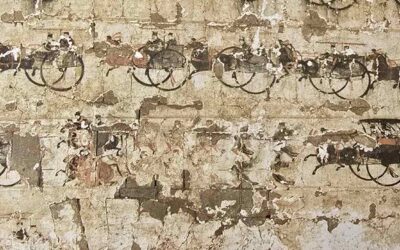The Primitivist: The Taoist Philosopher of Simplicity
The Taoist classic Zhuangzi is not the work of a single philosopher
Anyone who takes a closer look at the foundational works of Taoism will quickly discover that the book known as Zhuangzi was not entirely written by the philosopher Zhuang Zhou. It contains only a few chapters—seven, according to scholars—known as the “Inner Chapters,” possibly written by Zhuangzi himself or compiled from notes and recollections by some of his disciples. The rest of the book consists of ideas from other, unidentified philosophers who shared the views that later came to be labeled as Taoist during the Han dynasty, when the school was formally named.
Who was the Primitivist?
Among this now-anonymous group of philosophers, translators have been able to identify one, whose name is unknown but who is referred to as the Primitivist. The three chapters attributed to him follow immediately after the seven “Inner Chapters.” His writing is a hymn to simplicity and a sharp critique of benevolence and righteousness, which he sees as the root of all evils in the world. The Primitivist believed that the world could be improved by returning to the simplicity that existed before the mythical first emperors—a time that some romantically associate with the era of Shennong, who would later be revered as the god of agriculture.
The Golden Age as a World of Simplicity
As Hagop Sarkissian[1], to whom I thank for introducing me to this enigmatic philosopher, notes: “This golden age was an era in human society when progress was at a standstill and the people were content with the little practical knowledge they had accumulated for sustaining the time-consuming tasks of feeding and clothing themselves. The people were ignorant not because they spurred education or had some learning disability but because there was simply nothing for them to learn… -Before humans were distracted by pleasurable objects, musical instruments, elaborate art, and abstract argumentation, they had a pristine and unhewn inner power that allowed them to live in harmony with the myriad creatures.”
His critique focuses on the morality preached by the sages, and throughout his three chapters he relentlessly blames them for all the evils in the world. The most radical of these is the third chapter, Rifling Trunks, from which we’ve selected a few key ideas.
Benevolence and righteousness are found at the gates of the feudal lords Fashion pecks and bushels for people to measure by, and they will steal by peck and bushel Fashion scales and balances for people to weigh by, and they will steal by scale and balance. Fashion tallies and seals to ensure trustworthiness, and people will steal with tallies and seals. Fashion benevolence and righteousness to reform people, and they will steal with benevolence and righteousness. How do I know this is so? He who steals a belt buckle pays with his life; he who steals a state gets to be a feudal lord—and we all know that benevolence and righteousness are to be found at the gates of the feudal lords[2].
Cut off sageliness and then the great thieves will cease
Cut off sageliness, cast away wisdom, and then the great thieves will cease. Break the jades, crush the pearls, and petty thieves will no longer rise up. Burn the tallies, shatter the seals, and the people will be simple and guileless. Hack up the bushels, snap the balances in two, and the people will no longer wrangle. Destroy and wipe out the laws that the sage has made for the world, and at last you will find that you can reason with the people.
When men hold on to their eyesight, the world will no longer be dazzled. When men hold on to their hearing, the world will no longer be wearied. When men hold on to their wisdom, the world will no longer be confused. When men hold on to their Virtue, the world will no longer go awry.
Long ago
Long ago… the people knotted cords and used them. They relished their food, admired their clothing, enjoyed their customs, and were content with their houses. Though neighboring states were within sight of one another and could hear the cries of one another’s dogs and chickens, the people grew old and died without ever traveling beyond their own borders. At a time such as this, there was nothing but the most perfect order.
An Old Yet Very Current Message
The message of the Primitivist, despite its radical nature, succeeds in drawing the reader’s attention to the contradictions that progress forces upon us, revealing them even at such an early time. This is why many of his statements are not only still true, but even more true today, as we live in an increasingly imaginary reality, further removed from our internal nature. When we have reached a point where the fruits of knowledge could even lead to the destruction of humanity and our planet, the words of the Primitivist appear almost prophetic.
A Prophet of Degrowth?
No one can return today to that level of knowledge where it was enough to be able to feed and clothe oneself, because even now we cannot do so without the help of technology. However, being aware of how these generations of well-intentioned thinkers who have preached benevolence and righteousness have ended up being used by the powers of the world to transform the lives of the rest of the people is undoubtedly a valuable intellectual exercise.
[1] Sarkissian, Hagop. The Darker Side of Daoist Primitivism. Journal of Chinese Philosophy 37:2 (June 2010) 312–329
[2] This and the following quotes are from: “The Complete works of Zhuangzi”, traducido por Burton Watson. Columbia University Press, 2013.
About me: I have spent 30 years in China, much of the time traveling and studying this country’s culture. My most popular research focuses on Chinese characters (Chinese Characters: An Easy Learning Method Based on Their Etymology and Evolution), Matriarchy in China (there is a book with this title), and minority cultures (The Naxi of Southwest China). Yo can see my mis videos in Youtube, and more pictures about China in Instagram (pedroyunnan).
In travel, I have specialized in Yunnan, Tibet, the Silk Road, and other lesser-known places. Feel free to write to me if you’re planning a trip to China. The agency I collaborate with offers excellent service at an unbeatable price. You’ll find my email below.
Last posts
Why I devoted more than a year to researching suicide in Chinese culture
Why I devoted more than a year to researching suicide in Chinese culture In early November 2022 my friend, the psychiatrist Luz González Sánchez, told me that she was preparing a lecture on suicide. On the 8th of that same month, during a quiet moment, I made a brief...
The Kumbum of Gyantse and the secret of the ancient Buddhist temples
The Kumbum of Gyantse and the secret of the ancient Buddhist temples Almost everyone who visits Tibet with enough time includes Gyantse in their itinerary, and in this city, a visit to its famous Kumbum. This pyramidal building fascinates travelers with the exuberance...
The Tibetan Deity with a Horse Face
The Tibetan Deity with a Horse Face During my most recent journey to Tibet, someone pointed out to me in a temple a deity who bore a small horse upon his head. I knew that this protector is called Hayagriva, and that he is sometimes referred to as “Horse-Headed” or...
The Horse God as One of the Most Popular Deities in China
The Horse God as One of the Most Popular Deities in China If a visitor goes to the Great Wall at Juyongguan, the section closest to Beijing and one of the most historically significant, and takes the time to explore the complex of structures carefully—a...
The Discipline Paintings in Tibetan Temples
The Discipline Paintings in Tibetan Temples Among the paintings of deities, protectors, and other philosophical themes that usually decorate the entrance of a Tibetan Buddhist temple, some temples feature a very different kind of imagery. These are known as the “Keys...
The Beauty of Yamdrok Lake
The Beauty of Yamdrok Lake Yamdrok Lake is one of the four most important sacred lakes in Tibet, the one closest to the capital and the most frequently visited. Fan-shaped and opening toward the south, it stretches about 130 km from east to west and 70 km from north...










